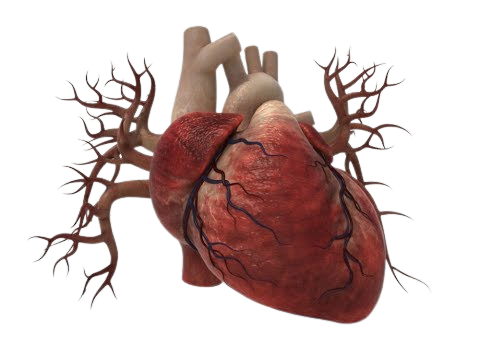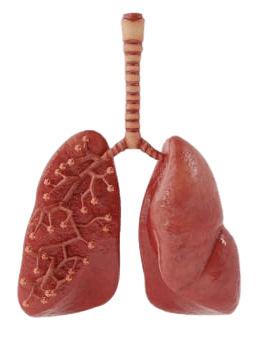Clinical Need
The ECM is constantly adapting and changing to allow cells to function properly and maintain balance within the body known as homeostasis. However, in chronic disorders, this process can become disrupted, leading to an excessive accumulation of ECM components called fibrosis. This thickening and scarring of tissue can cause chronic inflammation and ultimately lead to reduced oxygen and blood flow to the affected area.
Chronic heart and lung disorders are major areas of focus, as they are a leading cause of morbidity and mortality worldwide.


Heart
Chronic heart failure is also a major global health concern, affecting millions of people and causing significant morbidity and mortality. Heart Failure (HF) is a medical condition in which the heart cannot pump enough blood to sustain adequate oxygen supply and body functions. It is caused by various conditions that damage the cardiac muscles and lead to abnormal ECM remodeling, which impairs heart functions and reduces blood flow, ultimately leading to heart failure. In the US alone, there are more than 6 million HF patients – nearly 1 million cases every year – and this number is expected to grow 2-3% annually. HF is the leading cause of hospitalizations in adults over 65 years of age, with an annual treatment cost of over $35 billion in the US ($108 billion globally).
HF management is challenging with a poor long-term survival rate, demonstrating that nearly half of HF patients die within 5 years. In the case of HF, ECM remodeling manifests in two ways: Heart Failure with reduced Ejection Fraction (HFrEF) and Heart Failure with preserved Ejection Fraction (HFpEF). Both types represent about half of the total HF population.
The potential for XM Therapeutics’ technology is significant if it can demonstrate downregulation of the fibrotic remodeling process and angiogenesis with improvement in ischemia, leading to an improvement in clinical status, rehospitalization rates, survival rates and quality of life.
To expedite product development in cardiac indications, XM Therapeutics may target orphan diseases such as cardiomyopathies, myocarditis, and Chagas Disease. Myocarditis has received increasing attention due to COVID-19. XM Therapeutics is considering these diseases in the context of its overall cardiac program strategy.
1million
new cases every year
$35billion
p.a. treatment cost in the US
~50%
mortality rate within 5 years
200 types
of pulmonary fibrosis
1-1.5million
people with PF worldwide
>$100k
yearly drug treatment cost
300million
people with COPD worldwide
Lungs
Pulmonary fibrosis is a condition where the lungs develop scar tissue, leading to breathing difficulties. There are more than 200 types of pulmonary fibrosis, and the cause of most cases is unknown. However, research has identified several factors that may contribute to the development of the disease, including genetic mutations, smoking, and esophageal reflux.
The most common type of pulmonary fibrosis is idiopathic pulmonary fibrosis (IPF). While the exact number of cases of IPF is unknown due to diagnostic challenges, estimates suggest that in the US there are around 35,000 new cases each year and a total of around 100,000 people living with the condition (1 - 1.5 million globally). IPF is 10x more prevalent in senior populations. It is also more common in men than women (sex ratio, 7:3).
IPF is a chronic condition with no cure, and treatment can be costly, with drug treatments costing over $100,000 per year. Hospitalizations are also common, with a 30% chance of hospitalization within the first year of diagnosis.
Beyond IPF, pulmonary fibrosis can also manifest in other forms of interstitial lung disease, as well as in chronic obstructive pulmonary disease (COPD). COPD affects over 300 million people worldwide and is the third leading cause of death globally, after heart disease and stroke. Wall fibrosis and obliteration in COPD can also reduce breathing ability. The development of new therapies for these conditions is an important area of research led by XM Therapeutics.


